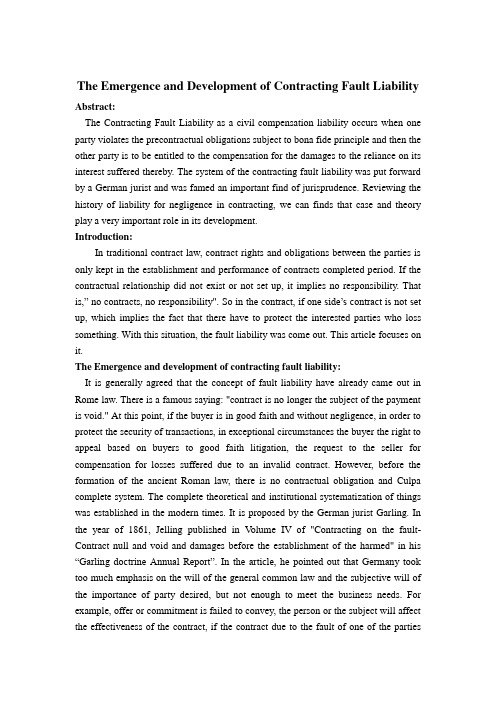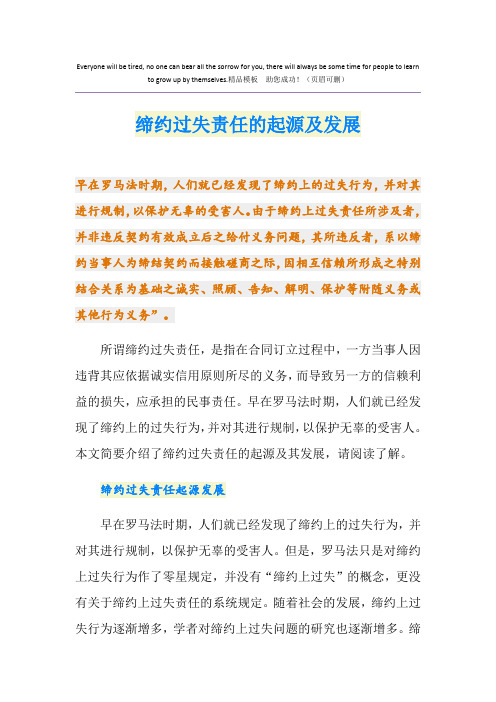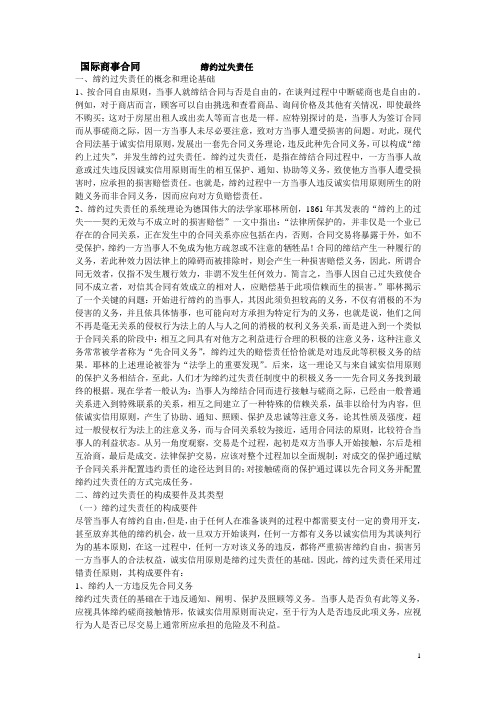法学专业外文翻译合同中缔约过失责任的产生和发展
- 格式:docx
- 大小:37.35 KB
- 文档页数:3


合同法名词解释缔约过失责任
嘿呀!今天咱们来聊聊合同法里的一个重要名词——缔约过失责任!
啥叫缔约过失责任呢?哎呀呀,简单来说,就是在合同订立的过程中,一方因为自己的过错给对方造成了损失,就得承担相应的责任呢!
比如说哈,甲和乙准备签个合同做生意。
在商量合同细节的时候,甲故意隐瞒了一些重要的信息,像产品质量有问题啦,或者公司财务有大麻烦啦!结果乙基于这些错误的信息做出了决定,最后遭受了不小的损失。
这时候,甲就得为自己的这种不诚信行为负责,承担缔约过失责任呀!
再比如说,甲向乙发出了一个合作的邀约,说得可好听啦,什么前景广阔、利润丰厚。
乙一听,心动了,马上投入了大量的时间和精力去做准备工作,还花了不少钱。
可到最后,甲突然反悔说不合作了。
哎呀呀,这不是坑人嘛!这种情况下,甲也得承担缔约过失责任,赔偿乙的损失呢!
那缔约过失责任有啥特点呢?哇,这可得好好说说!首先呢,它发生在合同订立的过程中,还没正式成立合同的时候哟!其次,责任的产生是因为一方有过错,故意或者过失都有可能。
而且,给对方造成的损失得是实实在在的,不是凭空想象的哟!
缔约过失责任和违约责任可不一样呢!违约责任是合同成立之后,一方不履行或者不完全履行合同义务才产生的。
而缔约过失责任是在
合同订立阶段就出问题啦!
哎呀,明白了缔约过失责任的重要性,咱们在签订合同的时候可就得小心谨慎啦!别稀里糊涂地就被人坑了,自己也别犯这种错误呀!不然,损失可就大了呢!
总之,缔约过失责任在合同法里可是个很关键的概念哟!大家都得重视起来,这样才能在商业活动中保护好自己的利益,避免不必要的麻烦和损失!哇,是不是觉得很有收获呀?。

合同法之缔约过失责任朱利平【摘要】缔约过失责任,是缔约人故意或者过失地违反先合同义务时依法应当承担的民事责任.本文主要从缔约过失责任的立法意义及依据入手,以案例方式阐述了缔约过失责任的特点及构成要件,分析了缔约过失责任的类型及赔偿责任,指出了缔约过失责任追究时值得注意的问题.【期刊名称】《四川警察学院学报》【年(卷),期】2010(022)002【总页数】5页(P100-104)【关键词】合同法;缔约过失责任;先合同义务;信赖利益【作者】朱利平【作者单位】四川化工职业技术学院,四川泸州,646000【正文语种】中文【中图分类】DF418缔约过失责任,又称作缔约上过失责任,即合同订立过程中的责任。
它不同于合同责任,但与合同责任又具有密切联系。
缔约过失责任的提出,目的是解决在合同订立过程中,可能会出现由于缔约当事人一方的不谨慎或恶意而使合同不成立或缔结的合同归于无效或被撤销,从而给信赖其合同有效成立的对方当事人带来损失,也可能一方当事人的过失而导致对方当事人的损失。
换言之,就是合同缔结当事人一方因违背诚实信用原则所应尽的义务,而致使另一方当事人的信赖利益遭受损失时,所应承担的民事责任。
一、缔约过失责任的意义及立法意义缔约过失责任,是基于现代商品交换复杂化和多样化的要求,鉴于侵权行为法和合同法功能上的欠缺,为保护缔约人的合法权益,而确立的一项法律原则和法律制度。
商品交换是个过程,在这个过程中双方当事人先进行初步接触,而后是相互磋商,最后是成立合约关系。
法律保护商品交换,应该对整个过程加以全面规制:对成交的保护通过赋予合同关系并配置合同责任的途径达到目的;对接触磋商的保护通过赋予无给付义务的法定债之关系并配置缔约上的过失责任的途径完成任务。
法律保护的并非仅是一个已经存在的契约关系,正在发生的契约关系也包括在内,否则契约交易过程将暴露于外不受保护,契约一方当事人难免成为他方疏忽或不注意的牺牲品。
缔约过失责任制度,已被各国合同法律制度确认。

The Emergence and Development of Contracting Fault Liability Abstract:The Contracting Fault Liability as a civil compensation liability occurs when one party violates the precontractual obligations subject to bona fide principle and then the other party is to be entitled to the compensation for the damages to the reliance on its interest suffered thereby.The system of the contracting fault liability was put forward by a German jurist and was famed an important find of jurisprudence.Reviewing the history of liability for negligence in contracting, we can finds that case and theory play a very important role in its development.Introduction:In traditional contract law, contract rights and obligations between the parties is only kept in the establishment and performance of contracts completed period. If the contractual relationship did not exist or not set up, it implies no responsibility. That is,” no contracts, no responsibility". S o in the contract, if one side’s contract is not set up, which implies the fact that there have to protect the interested parties who loss something. With this situation, the fault liability was come out. This article focuses on it.The Emergence and development of contracting fault liability:It is generally agreed that the concept of fault liability have already came out in Rome law. There is a famous saying: "contract is no longer the subject of the payment is void." At this point, if the buyer is in good faith and without negligence, in order to protect the security of transactions, in exceptional circumstances the buyer the right to appeal based on buyers to good faith litigation, the request to the seller for compensation for losses suffered due to an invalid contract. However, before the formation of the ancient Roman law, there is no contractual obligation and Culpa complete system. The complete theoretical and institutional systematization of things was established in the modern times. It is proposed by the German jurist Garling. In the year of 1861, Jelling published in V olume IV of "Contracting on the fault- Contract null and void and damages before the establishment of the harmed" in his “Garling doctrine Annual Report”. In the article, he pointed out that Germany took too much emphasis on the will of the general common law and the subjective will of the importance of party desired, but not enough to meet the business needs. For example, offer or commitment is failed to convey, the person or the subject will affect the effectiveness of the contract, if the contract due to the fault of one of the partiesand not established, the party at fault should the other party because of reliance on the establishment of contract losses liability? Garling replied: "the people who engaged in contracts were concluded, from a contractual obligation to trade outside the scope of the negative into a positive obligation on the lease area, which thus assume the primary obligation lies in contracting to be fulfilling the necessary attention. Protected by law, not just an existing contractual relationship, the contractual relationship is taking place should be included; otherwise the lease deal will be out, and out of protection. The parties created a contractual obligation, if such an effect because of legal obstacles to be excluded when the obligation will be to produce damages. There will be a so-called contract is invalid persons, refers only to fulfill effect does not occur, non - that he did not have any effect. In a brief, the parties make the contracts meaningless because of their own reasons do not contract who believed its contractual right for the effective establishment of the relative should pay for the damage. "[1] This is the Garling ‘s Contracting negligence theory, it is known as the Law on the findings. Since the Jelling theory put forward the theory of contracting negligence, it is seriously concerned by the world. And then it carried out more extensive and in-depth and systematic research and it also increasingly by some countries, legislation or judicial practice to accept them.In the “German Civil Code" times, the scholars begin to discuss it on the question of fault on the parties. Most of the drafters believes that contracting negligence theory of liability is not easy to accept and prescribed by a general principle, only in exceptional circumstances should be recognized. So, in 1900 the "German Civil Code," the drafters of the treaty on the fault is not fully accepted the theory, only in the wrong to withdraw (122), the right agent (179), from the outset the objective can not (307), etc. is limited adopted within the framework of this view, but the contracting negligence theory in the German judicial practice and doctrine have been developed rapidly and gradually formed a fine, large, complex and wide scope of application, the establishment of a generalized principle.In Japan, the jurisprudence has also acknowledged the responsibility of contracting negligence theory. In Japan's Case to find the bases of the fault liability from the trust and the city real credit principle, so the scope of this responsibility extended to the following areas: (1) Unable to perform the contract from the beginning so that the contract does not hold or invalid; (2) The contract shall only remain in the preparation stage of negotiation; (3) Contract effective establishment of the situation. Contracting fault liability is an effective establishment of the situation ofenough to matter if the targets were flawed and contractor who breach of contract.In Greece and Italy, contracting fault liability was concerned as a general principle. According to "Greek Civil Code" Article 197, it stipulates that: "When consultations on the occasion of the conclusion of contracts, the parties should have obligation to follow the trading practices and good faith." " The Italian Civil Code "section 1337 provides a "pre-negotiations and contractual responsibility," both "in the process of negotiation and conclusion of contracts, the parties should be based on the principles of good faith".In France, contracting fault liability has not been incorporated into the Civil Code. When a similar situation occurs, it will be handled in accordance with the tort law. But in recent years, the judicial practice shows that the contract law principles of contract is invalid or does not hold the party at fault when the responsibility to prosecute cases occur from time to time, such as the preparation protocol protection.In the English and American laws, there is no contracting fault liability concept in history. But after Mansfield incorporated duty of good faith into their laws with widespread support since 1933, the common law admits contracting fault liability. In 1933, Fuller, scholar in the US, comes out with "amends when damages trust in the contract laws" published in the “Yale Law Review”. The paper was discussed in detail with the expected benefits, trust interests and the performance benefits. "The United States Uniform Commercial Code," also confirmed the duty of good faith that is loyal to the fact. In there laws, the trust interests of the parties to the contract is a result of the trust each other's promise to pay the price or charges. "Can not go back on the promise" is their laws to protect the interests of a principle of trust. Their laws requires the court in establishing trust in the interests of the compensation promised to people without regard to how the subjective meaning. Only consider the defendant as a promise, whether we can make a reasonable person to become trusted. CONCLUSION:We may draw a conclusion that contracting fault liability has become a integrated system according to the regulations made in many countries for it based on Garling’s original theory. Compared with the original theory of Garling , there are a few developments.The first is the expansion of the scope. Contracting fault liability can not only be used for the beginning of contracting but also be applicable to the contract are recognized as invalid and be revoked when in breach of its offer to a valid offer and should bear responsibility for the case of contracting.Second, Garling’s theory thinks the responsibility for contracting negligence claims based on contractual obligations and fails to point out the strict differences between contractual liability and contracting liability. But the modern jurisprudence generally consider contracting responsibility is an independent responsibility and has strict differences with contractual and tortious responsibility.Third, most countries have accepted the responsibility of contracting fault liability theory, which the law or case law has clearly defined and reflected.Fourth, contracting fault liability’s "fault" not only includes “not pay attention fault”, but also contains “on purpose”.合同中缔约过失责任的产生和发展【摘要】缔约过失责任是在订立合同过程中缔约一方当事人因违反依诚实信用原则所应承担的先合同义务而造成另一方当事人信赖利益损失时所应承担的民事赔偿责任。

Everyone will be tired, no one can bear all the sorrow for you, there will always be some time for people to learn to grow up by themselves.精品模板助您成功!(页眉可删)缔约过失责任的起源及发展早在罗马法时期,人们就已经发现了缔约上的过失行为,并对其进行规制,以保护无辜的受害人。
由于缔约上过失责任所涉及者,并非违反契约有效成立后之给付义务问题,其所违反者,系以缔约当事人为缔结契约而接触磋商之际,因相互信赖所形成之特别结合关系为基础之诚实、照顾、告知、解明、保护等附随义务或其他行为义务”。
所谓缔约过失责任,是指在合同订立过程中,一方当事人因违背其应依据诚实信用原则所尽的义务,而导致另一方的信赖利益的损失,应承担的民事责任。
早在罗马法时期,人们就已经发现了缔约上的过失行为,并对其进行规制,以保护无辜的受害人。
本文简要介绍了缔约过失责任的起源及其发展,请阅读了解。
缔约过失责任起源发展早在罗马法时期,人们就已经发现了缔约上的过失行为,并对其进行规制,以保护无辜的受害人。
但是,罗马法只是对缔约上过失行为作了零星规定,并没有“缔约上过失”的概念,更没有关于缔约上过失责任的系统规定。
随着社会的发展,缔约上过失行为逐渐增多,学者对缔约上过失问题的研究也逐渐增多。
缔约过失责任理论正式提出一般认为归功于德国法学家耶林,1861年耶林在其所主编的<耶林法学年报>第4卷发表了<缔约上过失,契约无效与不成立时之损害赔偿>一文,始对此项问题系统分析:“当事人因自己过失致使契约不成立者,对信其契约为有效成立的相对人,应赔偿基于此项信赖而生的损害。
”“由于缔约上过失责任所涉及者,并非违反契约有效成立后之给付义务问题,其所违反者,系以缔约当事人为缔结契约而接触磋商之际,因相互信赖所形成之特别结合关系为基础之诚实、照顾、告知、解明、保护等附随义务或其他行为义务”。

国际商事合同缔约过失责任一、缔约过失责任的概念和理论基础1、按合同自由原则,当事人就缔结合同与否是自由的,在谈判过程中中断磋商也是自由的。
例如,对于商店而言,顾客可以自由挑选和查看商品、询问价格及其他有关情况,即使最终不购买;这对于房屋出租人或出卖人等而言也是一样。
应特别探讨的是,当事人为签订合同而从事磋商之际,因一方当事人未尽必要注意,致对方当事人遭受损害的问题。
对此,现代合同法基于诚实信用原则,发展出一套先合同义务理论,违反此种先合同义务,可以构成“缔约上过失”,并发生缔约过失责任。
缔约过失责任,是指在缔结合同过程中,一方当事人故意或过失违反因诚实信用原则而生的相互保护、通知、协助等义务,致使他方当事人遭受损害时,应承担的损害赔偿责任。
也就是,缔约过程中一方当事人违反诚实信用原则所生的附随义务而非合同义务,因而应向对方负赔偿责任。
2、缔约过失责任的系统理论为德国伟大的法学家耶林所创,1861年其发表的“缔约上的过失——契约无效与不成立时的损害赔偿”一文中指出:“法律所保护的,并非仅是一个业已存在的合同关系,正在发生中的合同关系亦应包括在内,否则,合同交易将暴露于外,如不受保护,缔约一方当事人不免成为他方疏忽或不注意的牺牲品!合同的缔结产生一种履行的义务,若此种效力因法律上的障碍而被排除时,则会产生一种损害赔偿义务,因此,所谓合同无效者,仅指不发生履行效力,非谓不发生任何效力。
简言之,当事人因自己过失致使合同不成立者,对信其合同有效成立的相对人,应赔偿基于此项信赖而生的损害。
”耶林揭示了一个关键的问题:开始进行缔约的当事人,其因此须负担较高的义务,不仅有消极的不为侵害的义务,并且依具体情事,也可能向对方承担为特定行为的义务,也就是说,他们之间不再是毫无关系的侵权行为法上的人与人之间的消极的权利义务关系,而是进入到一个类似于合同关系的阶段中:相互之间具有对他方之利益进行合理的积极的注意义务,这种注意义务常常被学者称为“先合同义务”,缔约过失的赔偿责任恰恰就是对违反此等积极义务的结果。
缔约过失责任缔约过失责任2007-12-15 22:46:43第1文秘网第1公文网缔约过失责任缔约过失责任(2)缔约过失责任缔约过失责任是指在合同订立过程中,一方当事人故意或者过失地违反先合同义务,造成对方当事人信赖利益的损失时,依法应当承担的民事赔偿责任。
缔约过失责任制度是民事责任制度中一个重要的组成部分,1861年德国法学家耶林提出缔约过失责任理论,被誉为法学上的发现,对各国立法和判例产生了深远的影响。
一、缔约过失责任理论的创立缔约过失责任(CulpainContrahendo)理论是由德国著名法学家耶林(RudolfV onJhering)最早提出,1861年,耶林在其主编的《耶林学报年报》第四卷发表了《缔约上过失,契约无效与不成立时之损害赔偿》一文,开始了缔约过失责任在理论上的深入探讨。
他认为:”从事契约缔结的人,是从契约交易外的消极义务范畴,进入契约上积极义务范畴,其因此而承担的首要义务,系于缔约时须善尽必要的注意。
法律所保护的,并非仅是一个业已存在的契约关系,正在发生中的契约关系亦应包括在内,否则,契约交易将暴露于外,不受保护,缔约一方当事人不免成为他方疏忽或者不注意的牺牲品!契约的缔结产生了一种履行义务,若此种效力因法律上的障碍而被排除时,则会产生一种损害赔偿义务。
因此,所谓契约无效者,仅指不发生履行效力,非谓不发生任何效力。
简言之,当事人因自己的过失致使契约不成立者,对信其契约为有效成立的相对人,应赔偿基于此信赖而产生的损害。
”①耶林关于缔约过失责任的理论,被誉为法学上的发现,对各国立法和判例产生了深远的影响。
在《德国民法典》制订之际,起草者大多认为不能将其作为一个一般责任要件加以规定,只能在特殊情况下予以承认。
故《德国民法典》仅在因意思表示发生错误而撤销(第122条第2款)、自始客观不能(第307条)和无权代理(第179条)的情况下,承认了缔约过失责任。
但是,德国的司法实践承认了缔约过失责任,而且判例及学说已将缔约过失责任发展为一般原则,形成了一个制度。
合同中缔约过失责任的产生和发展外文翻译Contractual Liability for Breach and Development: Foreign Language TranslationIntroduction:In the realm of contract law, the parties involved are bound by the terms and conditions agreed upon in the contract. Any act that violates the terms of the contract constitutes a breach of contract. When such a breach occurs, the party at fault may be held liable for their contractual obligations. However, in scenarios where contracts involve parties from different linguistic backgrounds, accurate foreign language translation becomes crucial. This article aims to explore the impact of foreign language translation on the formation, interpretation, and enforceability of contractual liability for breach.I. Understanding the Role of Translation in Contract Formation:1.1 Translation in the Negotiation Stage:During the negotiation stage, accurate translation is vital for ensuring that both parties fully comprehend the terms being discussed. Misinterpretation due to inadequate language skills or poor translation can lead to misunderstandings and potential conflicts in the future. Therefore, parties must engage professional translators or interpreters who possess the necessary language proficiency and legal knowledge.1.2 Incorporating Translation in the Written Contract:Once the negotiation stage has concluded, the terms agreed upon need to be accurately translated and incorporated into the written contract. The translated version should reflect the parties' original intentions without any ambiguity or misinterpretation. It is advisable to have the translated contract reviewed by legal experts to ensure its accuracy and to mitigate any potential risks or disputes arising from translation errors.II. The Impact of Translation on Contract Interpretation:2.1 Ambiguities in Translated Contracts:Despite efforts to create an accurate translation, certain concepts or legal terms may not always have direct equivalents in the target language. This can result in ambiguities, making it difficult to interpret the contract's provisions. Courts, when faced with such ambiguities, may resort to the doctrine of contra proferentem (interpretation against the drafter) to resolve the issue. Therefore, to avoid potential misinterpretation, parties should seek professional legal advice to facilitate a clear understanding of the contractual terms.2.2 Interpretation based on Local Laws:In cases involving cross-border contracts, the translation plays a crucial role in establishing how local laws and regulations impact the interpretation of the contract. Inaccurate or incomplete translations can lead to misunderstandings regarding each party's rights and obligations under local legal frameworks. To overcome this challenge, it is advisable to engage translators well-versed in both legal systems, enabling accurate and comprehensive translations that account for the nuances of local laws.III. Enforceability and Remedies for Breach:3.1 Difficulties in Enforcing Translated Contracts:When a breach of contract occurs, the translated version becomes the main reference for evaluating the breach and determining appropriate remedies. Courts rely heavily on the translated contract to ascertain the obligations of each party and decide the outcome of the dispute. Therefore, a well-executed and accurate translation is crucial for ensuring enforceability and protecting the interests of the non-breaching party.3.2 Remedies for Translation Errors:In the event of translation errors that significantly impact the contractual obligations, the aggrieved party may seek remedies for the losses incurred. These remedies may include reformation of the contract, rescission, or monetary compensation. However, the burden of proof lies with the aggrieved party to demonstrate that the translation error directly resulted in the loss suffered.Conclusion:In conclusion, foreign language translation plays a pivotal role in the formation, interpretation, and enforceability of contractual liability for breach. Accurate translation at every stage, from negotiation to drafting the written contract, is vital for ensuring that both parties fully understand their rights and obligations. Proper translation minimizes the risk of misinterpretation and ambiguity, reducing the likelihood of contractual disputes. To navigate the complexities of cross-border contracts, engaging professionals with expertise in both languages and legal systems is essential.By recognizing the significance of foreign language translation, parties can mitigate risks and establish a solid foundation for successful contractual relationships.。
缔约过失责任理论演变之初探给付自始客观不能缔约过失原则确立之后得适用的类型1.契约不成立;2.契约无效;3.缔约之际未尽通知等义务致他方遭受财产上损失;4.缔约之际未尽保护义务致他方身体健康遭受损害(三)缔约过失责任的性质初探耶林本人提出了缔约过失责任理论之后,就其性质,坚持法律行为说。
可见,缔约过失责任理论的提出,固然有耶林对于民法意思主义的不同认识,但是后人认为其乃突破意思主义的结果,尚存疑问。
缔约过失责任理论发展至今,早已抛弃所谓缔约过失属于拟制的法律行为这一理论。
王泽鉴先生也没有提出缔约过失责任的根本性质的判断,12◆法学研究仅仅就其功能上给予肯定,从而对应了立法的肯定———补充现法律规定或通说情形法理合同未成立型假借订立合同,恶意进行磋商⑧。
合同法第42条第1项包括:1.恶意开始磋商2.恶意继续磋商1.恶意:并非指损害他人为目的的的故意2.继续:已决意不与对方达成合同,但仍然继续磋商合同无效型无效、被撤销、不被追认的情形———为典型的缔约过失责任情形据合同法第58条,民法通则第61条第一款承担责任。
此处承担责任,可认为是缔约过失责任合同有效型1.违反情报提供义务情形第42条第一款的法律明确规定2.可撤销合同被变更⑨详见注释1.因撤销权的消灭而变为2.完全有效的合同撤销权1年消灭,而因为缔约过失而产生的请求权则有2年的诉讼时效在我国学说观点中的行为形态具体有以下情形:(1)假借订立合同,恶意进行磋商(见合同法第42条第1款);(2)欺诈缔约,即故意隐瞒与订立合同有关的重要事实或提供虚假情况(见合同法第42条第2款);(3)违反人格及人格尊严等违背诚实信用原则的缔约行为(见合同法第42条第3款);(4)擅自变更,撤回要约;(5)违反初步的协议或意向协议或许诺;(6)泄露或不正当地使用商业秘密;(7)订立合同中未尽保护义务而侵害对方人身权、财产权的行为;(8)违反禁止强制订约的义务;(9)缔约之际未尽通知、保密义务等给对方造成损失的缔约过失行为;(10)因一方过错使合同不能成立的行为;(11)因一方违反法律、法规致使合同无效的行为;(12)因一方过错使合同变更后无效的行为;(13)因一方过错使合同被撤销的行为;(14)合同不被追认的无效行为;(15)无权代理而订立合同的行为等。
法学专业外文翻译合同中缔约过失责任的产
生和发展
随着国际交流与合作的不断深入,法学专业外文翻译合同日益成为学者和从业人员关注的焦点。
在这些合同中,缔约双方之间的过失责任成为了一项重要的议题。
本文将探讨该责任的产生和发展,并提出一些建议以提高合同的效力。
1. 过失责任的产生
在法学专业外文翻译合同中,缔约双方的过失责任是基于合同法的相关原则而产生的。
根据《联合国国际货物销售合同公约》(CISG)第79条的规定,当一方未履行合同义务或者履行不符合合同约定时,构成了合同违约行为。
而该违约行为可以被视为过失,从而引发过失责任的产生。
过失责任的产生还与合同中的补偿要求相关。
一般来说,当合同一方的违约行为导致了对方的损失或损害时,违约方应承担相应的损害赔偿责任。
这种责任是通过法律程序来确定的,并需要考虑合同的具体规定以及相关法律的规定。
2. 过失责任的发展
随着时间的推移和不同国家法律制度的发展,法学专业外文翻译合同中缔约过失责任有了一些新的发展。
首先,过失责任的范围扩大了。
在过去,合同违约行为的责任主要限于导致对方直接损失或损害的情况。
然而,现在的合同法逐渐扩大
了违约方应承担的责任,将间接损失和损害纳入了赔偿范围。
这种扩
大的范围为受损方提供了更大的保障。
其次,过失责任的标准有所提高。
过去,在确定过失责任时,一般
要求违约方的过失行为是可预见的,并且具有必要的关联性。
然而,
现在的法律趋势是,只要违约方存在过失行为,无论是否可预见或关联,都会被认定为过失责任。
这一变化强调了违约方应对其行为负责
的原则。
再次,过失责任的免责条款受到限制。
过去,合同中的免责条款通
常被视为有效,使违约方可以在一定程度上免除责任。
然而,现在的
法律倾向于对免责条款加以限制,以保护受损方的利益。
这意味着,
在合同中加入过度宽松的免责条款可能无效。
3. 提高合同效力的建议
为了提高法学专业外文翻译合同的效力,缔约双方可以考虑以下建议:
首先,明确合同双方的权利和义务。
在合同中明确列出双方的权利
和义务,以确保双方的合作目标和期望一致。
其次,合理界定违约责任。
合同中对违约责任进行合理界定,包括
明确违约方应承担的损害赔偿责任范围等。
再次,谨慎使用免责条款。
在使用免责条款时,合同方应谨慎考虑,避免过度宽松的条款,以免影响合同的效力。
最后,诉讼解决争议。
合同双方可以在合同中约定在发生争议时采取诉讼解决的方式,以提高合同的执行力。
总之,法学专业外文翻译合同中缔约过失责任的产生和发展是一项重要的议题。
通过明确双方的权利和义务、合理界定违约责任、谨慎使用免责条款以及约定诉讼解决争议等方式,可以提高合同的效力,确保双方的合作顺利进行。